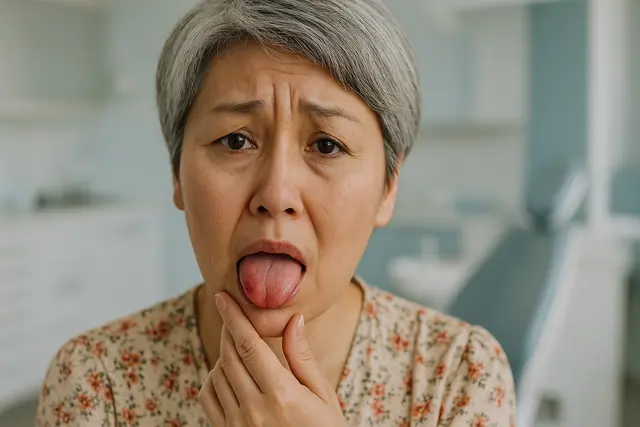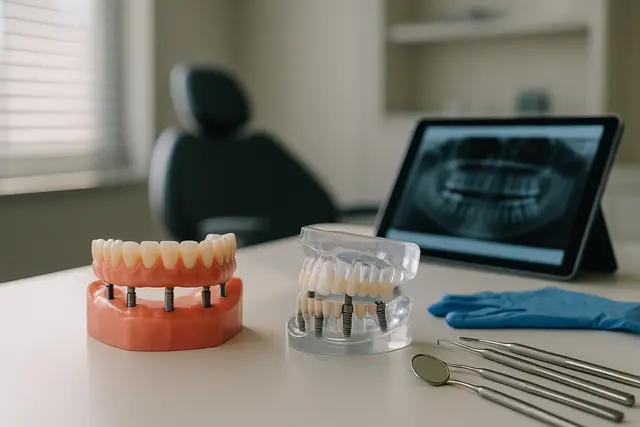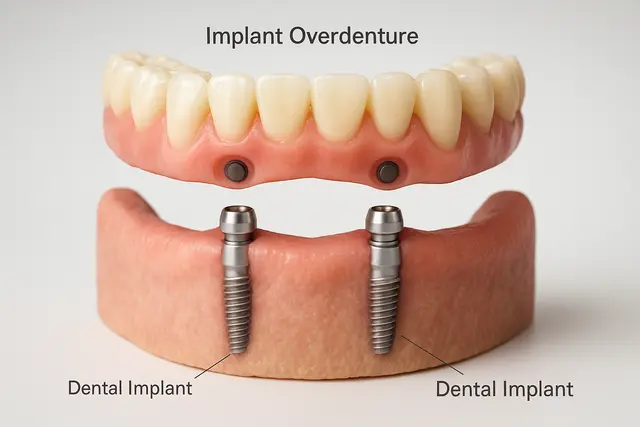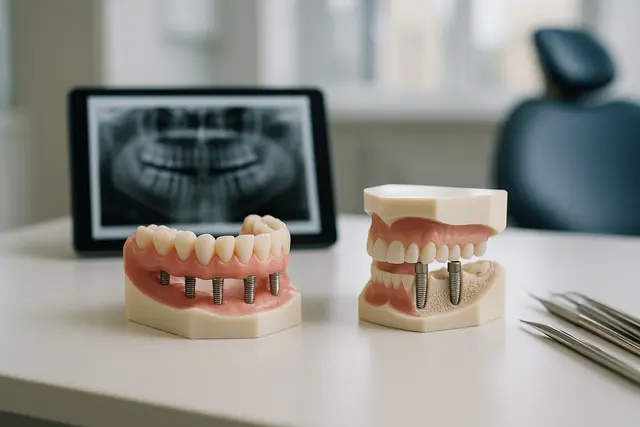Prosthodontics
6 min read
Sep 23, 2025
Why Am I Biting My Tongue After Dental Implants? Causes and Solutions
Dental implants can restore your smile, yet some people notice a new, frustrating habit afterward: accidentally biting their tongue. This often stems from temporary bite changes, healing bone, crown height or position, nighttime grinding, or even post-op dryness and numbness. Understanding why it happens and how to fix it can spare your tongue and speed up a smoother recovery.

So, you’ve finally gotten your dental implant. The hard part is over. Or is it?
You’re healing, eating soft foods like mashed potatoes and yogurt like a champ, and then it happens: you bite your tongue. Not once. Not twice. It becomes a daily surprise attack. If you’ve been asking yourself, “Why am I biting my tongue after dental implants?” you’re not alone.
Let’s dig into what’s really going on, what could be causing it, and most importantly, how to stop it before your poor tongue files a complaint.
Dental Implants and the Mysterious Bite Changes
Dental implants are a marvel of modern dentistry. They replace missing teeth, preserve bone, and give you back your confident smile. But even the best implants can throw your bite off, especially in the early stages.
After your dental implant surgery, your jaw and bite need to adjust to the new tooth. Your mouth has had time to get comfy with a missing tooth, and now that something's back in its place, your whole oral system might feel out of sync. That’s where accidental tongue biting can sneak in.
How the Implant Can Change Your Bite
Even with a perfectly placed implant, the surrounding teeth, jawbone, and muscles might not play nice right away. A new crown or abutment might slightly shift your bite. Or maybe the bone around the implant site is still healing and reshaping, affecting alignment.
Your dentist or oral surgeon likely checked your occlusion carefully, but sometimes minor changes occur after you leave the chair. This can lead to an edge-to-edge interarch relationship or a so-called transversal overbite, both of which may increase the risk of tongue biting.
It’s also possible you’re dealing with a palatal implant position, which shifts the crown inward, resulting in a more palatal implant position. That change can mess with your tongue’s movement.
The Role of Bone Healing and Stability
Let’s not forget what’s happening beneath the surface. After a dental implant is placed, the surrounding bone around the implant site goes through a healing process. Bone resorption occurs naturally, especially if a graft was involved, and as the jawbone heals, your implant’s position might subtly shift.
All of this can temporarily throw off your bite, especially if you’ve had multiple implants or work done in the posterior buccal zone, which is the part of your mouth closer to the back cheeks. Tongue biting related to posterior implants is a real thing.
Tooth Replacement Isn’t Just Plug-and-Play
Here’s something many patients don’t realize: replacing a tooth isn’t like replacing a Lego block. Even with the best dental craftsmanship, your body still has to adapt to the new addition. The arch of your teeth, your bite pattern, and even the way you chew may change.
Sometimes, the crown on your dental implant might be just a hair too tall or positioned at an awkward angle. That tiny difference can cause your jaw to shift slightly when you bite or chew, leading to you chomping on your tongue instead of your sandwich.
It Might Be the Medication
If you're on post-op medication, especially anything that causes dry mouth, numbness, or affects blood flow, your tongue might not be working at full awareness. That sluggish tongue is more likely to get in the way when you're trying to chew or talk.
Plus, decreased saliva production can increase plaque and bacteria, which can lead to gum issues or irritation. All of this can increase your chances of biting your tongue without even realizing it.
Stress, Smoking, and the Midnight Grind
Another sneaky culprit? Grinding your teeth at night. If you're clenching or grinding, especially during the implant healing phase, you're putting pressure on your jaw and possibly shifting the implant subtly.
Add smoking to the mix, and you’re not just delaying healing but also reducing oxygen flow to the surgical site, which could affect how your bite settles. It can also increase the risk of implant failure, gum disease, and other complications.
Is This a Serious Complication?
Short answer: usually no. Tongue biting after a dental implant is usually temporary. But if you’re biting the same spot over and over, it can lead to swelling, infection, or even a persistent sore. That’s when it becomes more than just annoying.
Persistent tongue biting may indicate a bite or occlusion issue that needs to be adjusted by your dentist. Ignoring it can lead to long-term discomfort and even implant complications if left unchecked.
Prevention and Management of Cheek and Tongue Biting
Now for the good stuff: how do you stop biting your tongue?
First, contact your dentist. A quick bite adjustment or evaluation of your dental implant crown might solve the issue.
It’s also recommended to consider a distinct cross-bite occlusion, especially if you’re experiencing discomfort and clinical signs associated with both an edge-to-edge interarch relationship or a so-called transversal overbite. Occlusion matters more than you think.
If your dental implant is in the posterior arch or close to the alveolar bone crest, small changes in positioning can originate from the more pronounced surgical site. That’s why your dentist may need to reevaluate things post-op.
Here’s what can help:
Schedule a consultation with your dentist if tongue biting becomes frequent.
Use an antibacterial mouthwash to prevent infection if the tongue is already sore.
Eat soft foods until things settle down. Avoid anything crunchy or chewy that might increase the risk.
Try a nightguard if you grind your teeth.
Stay on top of your oral hygiene: brushing and flossing properly can help prevent bacteria buildup.
Avoid tobacco or smoking to allow full healing.
Monitor your crown. If it feels too tall or oddly shaped, let your dentist know.
Could It Be Implant Failure?
Let’s not jump to worst-case scenarios, but yes, in rare cases, consistent tongue biting can be a symptom of a larger issue like implant failure.
If the implant isn’t integrating well with the surrounding bone or there’s peri-implantitis (a type of gum infection around the implant), it can cause instability, shifting, and pain. This can affect your bite and increase your chances of accidentally chewing on your own tongue.
Look out for red flags like:
Persistent swelling around the implant
Bleeding or pus
Loosening of the crown or abutment
Pain that doesn’t go away
These symptoms mean it’s time to contact your dentist right away.
Tips for Long-Term Success With Your Dental Implant
The good news? With proper care, dental implants have a high success rate. One of the most common causes of post-implant discomfort is simply an adjustment period.
But to make sure you don’t wind up in the “why do I keep biting my tongue” club, follow these steps:
Practice great oral hygiene: Keeping your gums and teeth clean will help prevent the well-known discomfort and clinical signs of infection.
Avoid smoking: It increases your risk of implant failure and bone loss.
Stick to follow-up visits: Your dentist can spot complications early.
Adjust your diet: Stick to soft foods during the healing process.
Be patient: Your body needs time to heal and adjust to the implant.
Don’t Let Your Tongue Be the Victim
Your tongue’s been through enough. While biting it after getting a dental implant might seem like a small annoyance, it’s often your mouth’s way of saying, “Hey, something’s a little off here.”
With the right prevention, regular checkups, and communication with your dentist, you can minimize tongue biting, help your mouth heal, and prevent the well-known discomfort and clinical signs that come with post-implant complications.
And remember: biting your tongue is not just part of the deal. It’s a sign to pause, reassess, and make sure your brand-new tooth is playing nicely with the rest of your mouth.
Why Do I Bite My Tongue After Getting a Dental Implant?
Tongue biting often happens because your bite needs time to adjust to the new implant. Your mouth may have adapted to the missing tooth, and when the implant is placed, even a slight change in alignment can cause your tongue to get in the way. Healing bone, shifting teeth, or a crown that sits slightly too tall can also contribute to this issue.
Can Medications or Habits Make Tongue Biting Worse?
Yes. Post-surgery medications that cause numbness or dry mouth can reduce tongue awareness, making it easier to bite accidentally. Grinding your teeth at night, smoking, or clenching can also stress the implant area and change how your bite settles, which increases the chances of biting your tongue repeatedly.
Is Tongue Biting After Implants a Serious Problem?
In most cases, tongue biting is temporary and improves as your bite stabilizes. However, if you repeatedly bite the same spot, it can lead to swelling, infection, or persistent sores. Frequent biting may also signal that your implant crown or bite alignment needs adjustment, so it’s important to let your dentist evaluate it.
What Can I Do to Prevent or Manage Tongue Biting?
Start by consulting your dentist, who can check your implant and adjust your bite if needed. In the meantime, eat soft foods, avoid chewing on the implant side until you’re comfortable, and consider using a nightguard if you grind your teeth. Keeping up with oral hygiene, avoiding tobacco, and using antibacterial rinses if your tongue is sore will also reduce complications and help your mouth heal smoothly.
Read Next
Related Posts

Prosthodontics
Implant Supported Dentures Overview
Missing teeth can impact more than just your smile, they can affect your confidence, comfort, and even your diet. Fortunately, modern dentistry offers a solution that’s both secure and natural-looking: implant-supported dentures. This innovative approach blends the stability of implants with the convenience of dentures to create a long-lasting, life-improving upgrade.
5 min read
Oct 29, 2025

Prosthodontics
Implant Overdentures Explained: The Hybrid Solution to Missing Teeth
Missing teeth can impact everything from your ability to eat to your self-confidence. While traditional dentures have long been a go-to solution, they often fall short in comfort and stability. Implant overdentures offer a modern alternative that combines the security of dental implants with the convenience of removable dentures, a true upgrade for those looking to reclaim their smile.
6 min read
Oct 29, 2025

Prosthodontics
Implant Retained Dentures Explained
Considering implant-retained dentures? You're not alone. As modern dentistry evolves, more people are turning to this secure, natural-feeling alternative to traditional dentures. This guide will walk you through what they are, how they work, and why they might be the solution you've been looking for.
4 min read
Oct 28, 2025
Don’t have time to research every dentist around you?
See why 30k+ patients trusted us